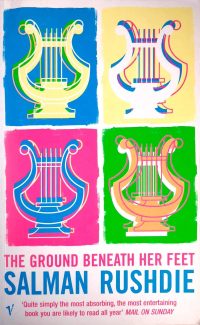India, fount of my imagination, source of my savagery, breaker of my heart
 The Ground Beneath Her Feet
The Ground Beneath Her Feet
by Salman Rushdie
I think I was at university the first time I started reading this. I stopped around 100 pages in, overwhelmed by the relentless references to mythology (Greek, Roman, Norse and Indian), religions, history and language. I think I needed to spend another 15 (plus) years absorbing information about all those things to not only appreciate but truly enjoy this novel. And this time I loved it.
This is an epic tale, centred on a love triangle but encompassing so much more of life and the world than that suggests. The “her” of the title is Vina Apsara, half-American, half-Indian, raised in poverty, handed off from relative to relative until she lands on the doorstep of the Merchant family in Mumbai.
The grand love of her life is their near neighbour Ormus Cama, youngest son of a rich Parsi family. His twin brother was stillborn but Ormus dreams of him, swears that his dead brother feeds him the music and lyrics that he writes.
“That was how we spoke, my mother and I: in puns and games and rhymes. In, you might say, lyrics. This was our tragedy. We were language’s magpies by nature, stealing whatever sounded bright and shiny. We were tinpan alleycats, but the gift of music had been withheld. We could not sing along, though we always knew the words.”
When they first meet, Ormus is 19 and Vina is 12. It’s love at first sight for both of them, but Ormus swears he will not touch Vina until her 16th birthday. It’s the start of a lifetime of power play between them.
The third corner of the triangle is Rai Merchant, only child of the Merchants until they take Vina in, and our narrator. He’s a photographer, a very successful one, but when he meets Vina he’s even younger than she is, so he has to watch his beloved play out her love story before it hits a rocky period and he sees his chance.
Vina, Ormus and Rai each in their turn leave India for the UK and then the US. The way Rai describes this feels a lot like Rushdie is using the opportunity to express his own feelings about having to leave his homeland behind. This was published in 1999, 10 years after Rushdie left India fearing for his life, but at this point it was still unclear whether he would ever be able to return.
“India, my terra infirma, my maelstrom, my cornucopia, my crowd. India, my too-muchness, my everything-at-once, my Hug-me, my fable, my mother, my father and my first great truth. It may be that I am not worthy of you, for I have been imperfect, I confess…India, fount of my imagination, source of my savagery, breaker of my heart. Goodbye.”
One aspect of this book I found a little strange. It takes place in a parallel universe where historical events happen slightly differently, in large and small details. Famous songs are sung by different bands. Different members of bands become the big stars. Ormus’s dreams give him glimpses of our reality, and he becomes confused about which universe is real.
I found this conceit disorienting, touching on magical realism, but what was what it for? I couldn’t quite get a handle on what it added to the book besides an instability in Ormus’s character. I didn’t outright dislike it, just felt it was perhaps an odd additional complication in an already big and complex tale. I suppose it certainly adds to the grandness of the story’s scale, though as the book opens with a major earthquake, grand drama is hardly lacking.
“This is how people behave when their dailiness is destroyed, when for a few moments they see, plain and unadorned, one of the great shaping forces of life. Calamity fixes them with her mesmeric eye, and they begin to scoop and paw at the rubble of their days, trying to pluck the memory of the quotidien – a toy, a book, a garment, even a photograph – from the garbage heap of the irretrievable.”
But overall I loved this book. The language is luscious. Its epic sweep takes in sex, love, friendship and family, as well as all the cultural references. The characters are all extreme in some aspect but they’re too complex to be caricatures. Vina, Ormus and Rai are all frustrating people (though it must be said we get to know Ormus and Rai much better than Vina, who remains to a degree ephemeral) but that doesn’t matter as the storytelling is so rich and enjoyable.
Published 1999 by Jonathan Cape.
Source: secondhand, but too long ago for me to remember where.